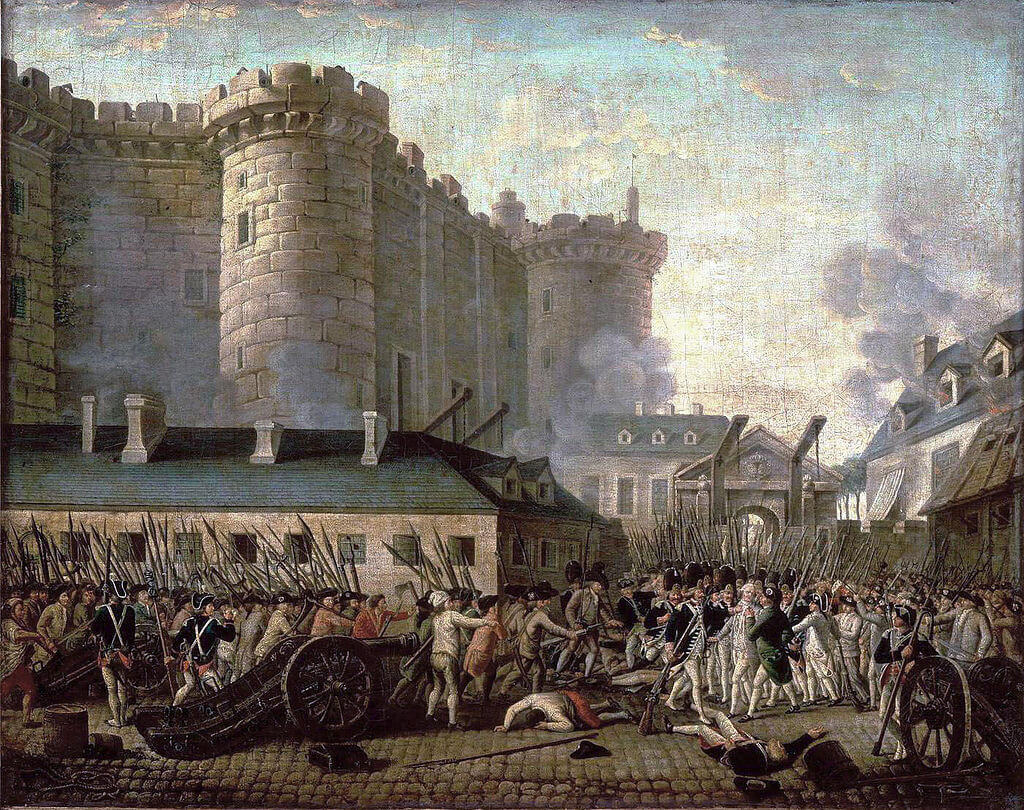Updated January 18, 2023
About French Revolution
The French Revolution was an era of ideological, political, and social unrest in France’s and Europe’s history. The French Revolution began in 1789 and finished in the late 1790s with Napoleon Bonaparte’s accession; it was a defining moment in world history. During this time, French citizens uprooted centuries-old organizations, including the monarchy and feudalism. These transformations were by violent upheaval, involving executions and oppression during the Reign of Terror and riots across the various European states.
(Image Credit: National Archives)
Timeline of the Revolution
- 1789: For the first time in 175 years, the Estates-General met, and the Third Estate, which represented the ordinary people of France, requested more involvement.
- 1790: The Tennis Court Oath, in which members of the Third Estate vowed to remain until France’s government was changed, resulted in the formation of the National Assembly.
- 1791: The National Assembly formulated the Constitution of 1791, establishing a limited monarchy.
- 1792: France declared war on Austria by launching the First Coalition War.
- 1793:The Reign of Terror started in response to internal and external threats to the revolution, and hundreds were killed, including King Louis XVI and Queen Marie Antoinette.
- 1794: The Reign of Terror ended with Robespierre’s
- 1795: The Directory, created due to the Thermidorian Reaction, was a five-member administrative body that administered France until 1799.
- 1799: Napoleon deposes the Directory and creates the French Consulate. With Napoleon as France’s new emperor, the French Revolution ended.
Causes of the French Revolution
According to historians, various factors were responsible for the French Revolution. The factors are into two parts: economic and socio-political factors.
#1 Economic Factors
- The social costs of war included a massive war debt exacerbated by the monarchy’s military failures and inefficiency and a lack of social care for war veterans.
- A bad economy and an overwhelming national debt were created and aggravated by the weight of a highly unjust taxing system.
- The Roman Catholic Church imposed a harsh tax duty on crops. The tax system worsened the situation of the poor, who were already struggling with starvation.
- Mass unemployment and rising bread costs caused people to spend more money on food and less on taxes.
- During the months leading up to the revolution, widespread hunger and malnutrition raised the probability of sickness and mortality. The famine spread to other parts of Europe, impacted by a lack of bulk food delivery.
#2 Socio-Political Factors
- People oppose absolute monarchy.
- The public started to resent the control and privileges of the greedy professional and commercial classes.
- Manorialism (a socio-political system under which the peasants depended on the European landlords) was despised by peasants, wage laborers, and, to a lesser extent, by the capitalists.
- People started movements against the clergy privilege (anti-clericalism) and religious freedom ideals.
- The citizens were not happy with the King for dismissing Jacques Necker and Anne Robert Jacques Turgot.
- The failure of Louis XVI and his counselors to address any of the concerns and problems of the state’s people was a significant factor. The peasants had developed a feeling of distrust toward the monarchy’s rule.
Consequences of the Revolution
Following the uprisings in the revolution, the state faced many consequences due to the French Revolution.
- The French Revolution had a far-reaching impact. It abolished the monarchy and established democracy in France.
- The Estates-General met for the first time in nearly 150 years. As a result, The National Constituent Assembly developed.
- It also prompted other nations to wage war on France.
- King Louis XVI and his fiancee, Marie Antoinette, were executed for corruption.
- The French Revolution led to the rise of Napoleon Bonaparte, who was initially a military general. He soon ended up becoming the emperor of France. Napoleon established his rule as an absolute monarch and expanded the French empire.
Conclusion
The French Revolution was an era of ideological, political, and social unrest in France’s and Europe’s history. The French Revolution began in 1789 and finished in the late 1790s with Napoleon Bonaparte’s accession; it was a defining moment in world history. During this time, French citizens uprooted centuries-old organizations, including the monarchy and feudalism. These transformations were by violent upheaval, including executions and oppression during the Reign of Terror and riots in various European countries.

